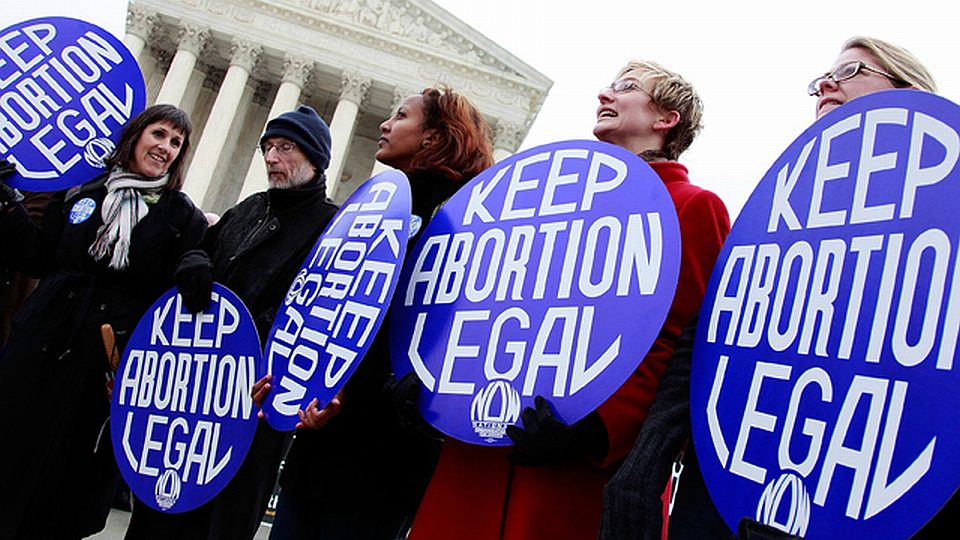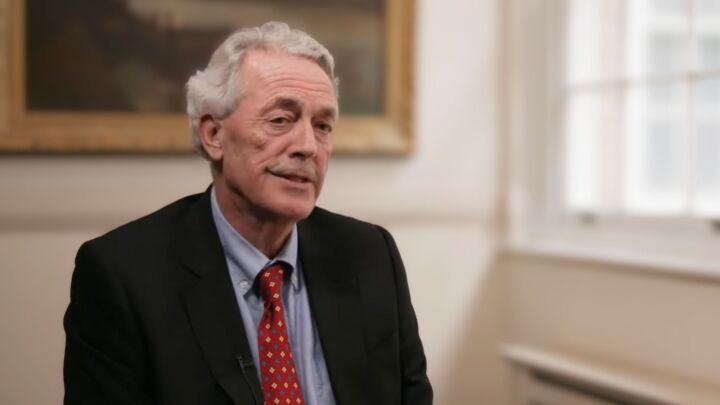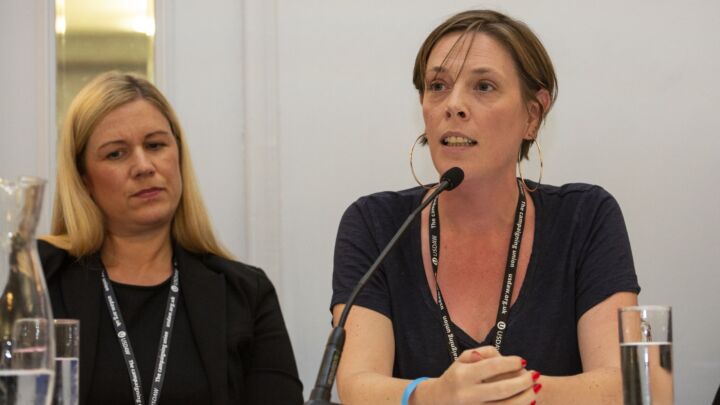A manifesto for the right to abortion
Katha Pollitt cuts through the defensiveness of the pro-choice movement.

Want unlimited, ad-free access? Become a spiked supporter.
Katha Pollitt is one of my favourite American columnists. She’s outspoken about her support for reproductive choice. She’s smart, thoughtful and engaging. She is therefore a good person to address those she calls the ‘muddled middle’ on abortion.
The ‘muddled middle’, according to Pollitt’s brilliant new book Pro: Reclaiming Abortion Rights, refers to those who do not identify themselves as being either for the principled right of a woman to choose abortion or the principled right of the state to prohibit abortion. They’re the people who think that abortion is mainly wrong, but that it should be allowed in particular cases; they’re the people who think that abortion should be legal but discouraged, and only available as a last resort, or to particularly ‘vulnerable’ women; they’re the people who think that there are too many abortions, that it’s too easy to get one. They’re the kind of people you often find yourself talking to in a bar, or at a dinner party, or at your kid’s football game.
The constituency of the ‘muddled middle’ is huge. In Britain, the muddled middle tends towards favouring abortion – better than forced motherhood, but not as good as preventing the pregnancy in the first place. We are largely a ‘pro-choice, but…’ country, a country in which the ‘but’ encompasses discrete areas where people find it more difficult to agree that an abortion decision should be left to the woman.
Pollitt sees the US as a ‘pro-choice, but’ country, too – although in the US, it is indisputable that the ‘but’ territory sprawls much wider. To a great extent, people in the UK have been protected from having to engage with the politics of what abortion decision-making means. This is because, ultimately, our law medicalises the decision: an abortion is only legal if two doctors agree, etc. In the US, doctors’ decisions are not an issue – at least not in early pregnancy. If a woman can access a clinic that can provide abortion, and she can afford it, the abortion is at a woman’s request and needs no further justification. It’s a private matter (as it should be in the UK). But while that saves women from the scrutiny of doctors, it takes away the protective screen that medical approval provides. A woman’s private choice appears as just that: a woman’s private choice.
So in Britain, in the context of a law that formally provides a legal defence for doctors, but no choice at all for women, extending a woman’s choice seems pretty reasonable, even radical. In the US, where abortion is already seen as a woman’s choice, extending that choice may strike a different note. Moreover, in the more conservative social and economic environment of the US, in which religion plays a greater role and society is more fragmented, it’s easy to see why those at your dinner table or at the soccer game may be less liberal towards women’s reproductive decisions.
This has long been a concern for advocates of women’s reproductive rights in the US. The campaigns that once rallied for ‘free abortion on demand’ have become concerned that principled support for reproductive choice appears ‘extremist’ and alienating. Opinion polls tend to show that just 15 per cent of the US population are staunch supporters of freely available legal abortion and about 15 per cent are staunch opponents (although this can vary hugely from state to state). But, for advocates from both sides, the 70 per cent in the middle is the group to play for. How to ‘frame messages’ for this constituency is a preoccupation for campaign groups on both sides.
During the noughties, pro-choice campaigning groups were primarily concerned with combating the mistaken view that they were ‘extremist’ and promoted an ‘any time, any place, anywhere’ mentality that had little connection with most people’s visceral distaste for the termination of life in the womb. Organisations such as NARAL Prochoice America shifted the emphasis from campaigning for a ‘woman’s right to choose’ to a position closer to that of Hillary Clinton – ‘abortion should be safe, legal and rare’. Discussion of the need to call a truce in the abortion wars and find common ground led to NARAL’s president sending an open letter to the anti-abortion Right to Life Movement appealing for their support to increase the availability of contraception. The letter was entitled: ‘Please help us prevent abortion.’ The intention was to bring those who supported pregnancy prevention into a broad alliance.
More recently, pro-choice campaigners have decided that not only is a focused campaign for abortion access off-putting, but so is the composition of the movement: its structures, its leaders, its messages, and even its identity as a movement for choice. So, over the past few years, there has been an attempt to integrate what has come to be perceived as a white, middle-class, privileged movement for abortion into a diverse broad movement for justice in which the age, skin colour, social background, ethnicity and self-identity of its members matters more than its politics and goals. As I’ve discussed elsewhere on spiked, a reproductive-justice movement, which seeks to find common ground on the basis of experience and identity, jettisons abortion choice as a privileged concept of marginal concern or, at best, just one issue among many. As Pollitt notes: ‘So defensive has the pro-choice community become… that in 2013, Planned Parenthood announced that it was moving away from the term “pro-choice”, which was already a bit of a euphemism. Choose what?’
Pollitt’s writing blows like a breeze through an open window across the self-absorbed introspection of much of this recent discussion. Pro is a manifesto for abortion as a woman’s right and a social good. It is a pacy presentation of why abortion is a fact of life for modern society that will never be made rare as long as women aspire to control when and by whom they bear children. Instead, Pollitt argues abortion should be seen as part of the reproductive experience of motherhood – not its antithesis. It should be understood as a positive experience that reaffirms the importance of women’s lives. Pollitt presents the termination of a pregnancy as something that can be good for women, for families and for society. The common ground that she seeks is ideological: it is a common understanding of why abortion is necessary and why it is not wrong.
This reframing and reclaiming of abortion would be welcome in any form. The pithy, rational and truthful answers to anti-abortion arguments are a gift. At points, such as in her chapter on what Americans think about abortion, Pollitt behaves like that friend at your dinner party who does not quite know when to stop eviscerating your other guests.
Pollitt says she wants to put real women ‘back at the centre of the way we talk about abortion’. The actual women who seek abortion, she claims, have been pushed into the shadows: ‘It’s one thing for a rape victim to speak up or a woman with a wanted pregnancy that has turned into a medical catastrophe. But why can’t a woman just say, This wasn’t the right time for me? Or two children (or one, or none) are enough. Why must the woman apologise for not having a baby because she just happened to get pregnant?’
Abortion, Pollitt believes, is simply an urgent practical decision that is ‘just as moral as the decision to have a child’. For this reason, her book should be welcomed – and read.
Those steeped in the politics of the pro-choice movement will, of course, find points of difference with Pollitt. For me, there’s too great an assumption that those who oppose abortion are either ill-informed, or using a ‘pro-life’ stance duplicitously as a means to compel women to fulfil traditional domestic roles, involving motherhood and sexual submission. And I do think there’s too great a willingness to believe that the Catholic Church and Republican right are the instigators of anti-abortion views, and, as a result, there is too little attention given to less obvious, more complicated opponents, such as feminists who claim that abortion damages women, and reproductive-justice advocates who claim that choice is a privileged, ‘consumerist’ outlook.
It’s easy to deal with the pope’s opposition to abortion; but it’s not so easy to dismiss disability-rights groups who argue that abortion because of fetal anomaly is disrespectful to those who are disabled and should be denied.
I strongly support Pollitt’s argument that abortion and motherhood should be framed and understood together, and that the right to mother and the right not to mother should be coupled. But I don’t accept that this coupling can only happen in a broad framework of reproductive justice, which characterises abortion choice as a white, middle-class, privileged demand. And I don’t accept, as Pollitt seems to, that a focus on women’s choice – her capacity to make decisions, her moral agency – has weakened a movement by making it of interest only to a privileged elite.
Those who have no privilege need the right to choose abortion when they wish – just as they need the right to continue a pregnancy when they choose.
All women need to be able to assert the right to decide the future of a pregnancy. The best thing we can do is to supplement Pollitt’s cunning range of arguments with those of our own, to defend not just abortion but also the very concept of choice itself.
Ann Furedi is the CEO of bpas, the British Pregnancy Advisory Service.
Pro: Reclaiming Abortion Rights, by Katha Pollitt, is published by Picador USA. (Order this book from Amazon(UK).)
You’ve read 3 free articles this month.
Support spiked and get unlimited access.
Help us hit our 1% target
spiked is funded by readers like you. It’s your generosity that keeps us fearless and independent.
Only 0.1% of our regular readers currently support spiked. If just 1% gave, we could grow our team – and step up the fight for free speech and democracy right when it matters most.
Join today from £5/month (£50/year) and get unlimited, ad-free access, bonus content, exclusive events and more – all while helping to keep spiked saying the unsayable.
Monthly support makes the biggest difference. Thank you.










Comments
Want to join the conversation?
Only spiked supporters and patrons, who donate regularly to us, can comment on our articles.